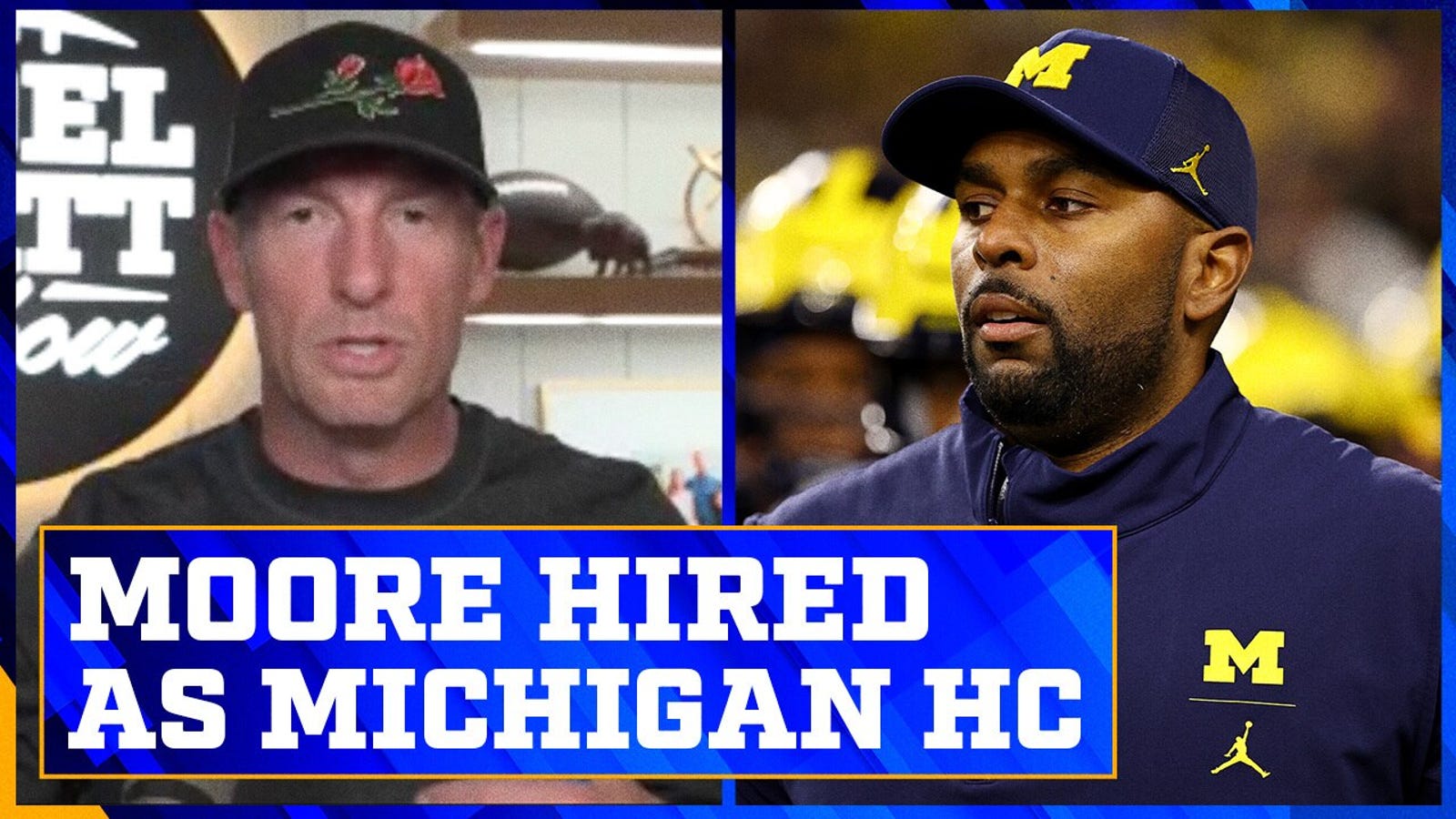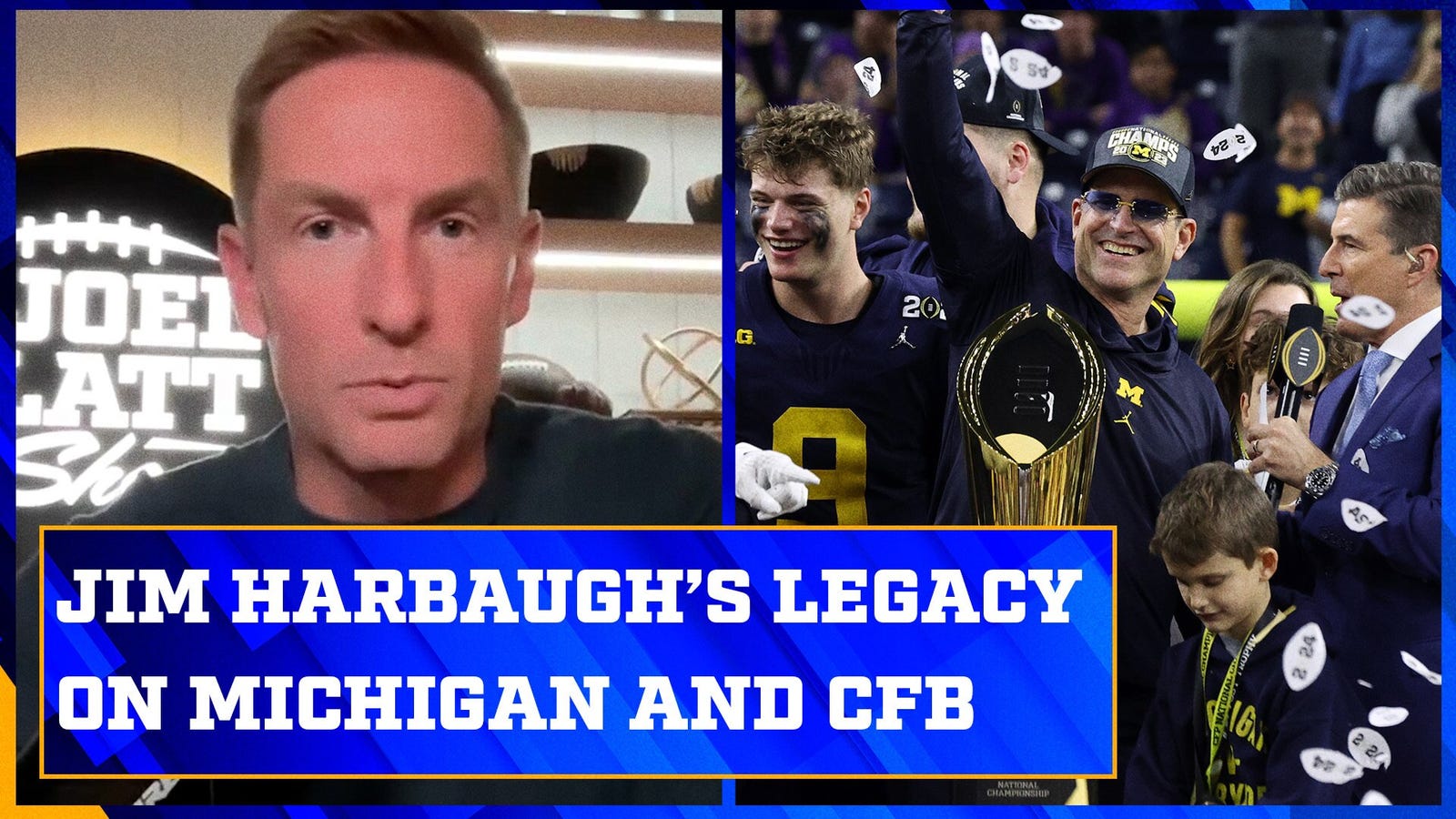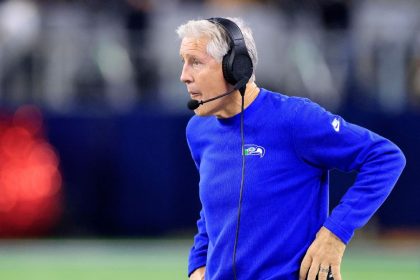In a no-brainer move, Sherrone Moore is Michigan‘s next head coach.
From the moment Jim Harbaugh became the Chargers‘ next head coach, we all thought Moore should be Michigan’s next head coach. Michigan was able to supersede the seven-day posting bylaw too, naming Moore as its head coach on Friday just two days after Harbaugh left.
Moore made an undeniable case for the job when he was the acting head coach during Harbaugh’s second three-game suspension of the season. You don’t do that and not get this job, especially considering that Michigan built such a special culture en route to winning the national championship.
You want to have continuity after doing that, especially after the drastic three-year turnaround Michigan underwent. Harbaugh built something that has legs and is sustainable. Now, that sustained effort is going to be controlled by Moore.
ADVERTISEMENT
The contract Moore got, which was a five-year deal that pays $5.5 million annually, seems about right, too. That’s in line with what Ryan Day got when he took over for Urban Meyer at Ohio State in 2019 and what Lincoln Riley got when he took over for Bob Stoops at Oklahoma in 2017. Steve Sarkisian received a similar deal when he became Texas‘ head coach in 2021.
All of those coaches have since earned bigger deals because they’ve all had a lot of success. Moore should have a lot of success as well because he’s already proved he can do it. He didn’t have to go into a job interview and say, “This is what I would do if I was the head coach.” They got to see it in practice and they saw it in the biggest games of Michigan’s regular-season schedule.
Moore picked up a decisive win over Bowling Green in the one game he served as Michigan’s acting head coach during Harbaugh’s first three-game suspension. Later in the year, right when Michigan was playing its biggest games of the season, Moore steered the ship when Harbaugh received his second three-game suspension. It won big road games against Penn State and Maryland before beating Ohio State.
That’s the job interview. You didn’t have to have a job interview to know what Moore could do as a head coach. He did a great job in those games. Their game plans were terrific. His key adjustment against Penn State was outstanding, realizing that Michigan wasn’t going to be able to block the opposing pass rush. So, Moore went big, putting extra offensive linemen on the field and ran the ball 32 straight times to win the game. An incredible adjustment as the acting head coach and playcaller.
The other reason the decision to promote Moore was a no-brainer was the stability. If this offseason has proved anything, it’s that no program is immune from the chaos that comes with a coaching change. Look at Alabama, it suddenly became the case study of that after Nick Saban’s retirement. He retired as the greatest coach in the history of the sport and chaos ensued immediately.
So, the fact that Michigan had a guy who’s been in the program and helped build the title-winning culture in the program made Moore’s promotion a must and one that it needed to act on quickly. Michigan did just that, hoping to avoid the same chaos Alabama just dealt with.
And Ohio State fans, take note of this. For those of you who want Day to be fired, you’re going to end up starting from ground zero, which you want to avoid unless you absolutely need to reset the program. What’s better is to just identify what you’re going to do to change and go do that, which Ohio State seems to have done this offseason.
The top priority for Moore should’ve been to keep strength and conditioning coach Ben Herbert. But it doesn’t look like he was able to do that as he’s following Harbaugh to the Chargers. We don’t know how that went down yet, but I thought Herbert was going to remain in Ann Arbor.
The next big priority for Moore is going to figure out who’ll be calling offensive plays. This is a little different than Day’s or Riley’s situations when they were promoted to head coach. Both of those coaches called plays for an extended period of time and that was really their superpower. This past season was Moore’s first as the sole offensive playcaller, so it’s not like he has an extended history of doing that, though he did a great job of it.
Being a playcaller isn’t in Moore’s DNA like it was for Day or Riley, so it should be easier for him to move into a CEO role as Michigan’s head coach. Those guys got their starts as head coaches because of their ability to call plays. That’s not why Moore became Michigan’s head coach. In fact, it might be too difficult for a college football coach in this day and age to do well as a head coach and a playcaller. I think that’s why Day opted to bring Bill O’Brien this offseason, for instance, and he’s one of the elite playcallers in the sport.
If Moore opts to go in that direction, quarterbacks coach Kirk Campbell seems to be a likely candidate for the role. I like Kirk a lot and he did a really good job with developing J.J. McCarthy this past season.
The other big thing Moore will have to settle is on the defensive side. I expect defensive coordinator Jesse Minter to follow Harbaugh to the Chargers. So, who is the extension of Minter and former Michigan defensive coordinator Mike Macdonald? Their defenses became just as much of an identity of the program as the run game did. Because of that, you have to find a way to hold onto both pillars.
That’s going to be difficult for Moore. You can’t run a different defense, the players will look at you with their eyes crossed and say, “We can’t run a different defense. We just beat Ohio State three times with this defense.” So, Moore’s going to have to find that extension of Macdonald and Minter to keep that defense at a dominant level.
Moore’s going to be caught in a difficult spot as he takes over. He’s not going to want anything to change, for obvious reasons. Yet, everything has to change at Michigan. He has to keep the culture and systems in place, but he also can’t be Jim Harbaugh. He can’t try to be him, either.
This has to turn into Sherrone Moore’s program and he’s going to have to authentically be himself, which he admitted at his introductory news conference on Saturday.
“I’m going to be me,” Moore said. “I think in this business, or in any [business], if you’re not yourself, you’re going to lose the people around you. So, I’m going to be myself, be who I am, my leadership style and how I’m going to approach things. I’m going to do that. I’m going to lean on him tremendously, because of what he’s built and what we’ve built here.”
The locker room will find you if you’re not authentic. It can detect your BS quickly. Being inauthentic might fly in other areas in life, but it doesn’t fly in college football locker rooms, especially in successful ones. Those players have already seen Moore in his good times and bad times already, so they’ll be aware if he’s inauthentic.
Moore can even lift this program up to a higher level. It hasn’t recruited at the top end compared to the rest of the sport. Now, you could argue that Michigan recruited the right type of players into its program, but you can still improve it. Maybe Moore has a little bit more energy to do that.
Harbaugh builds programs so that they can have success after he leaves. There’s an idea from this book I really like, “Good to Great” by Jim Collins, that you have to have the right people at the right places on the bus in order to have success in any company and when you have success, you have to keep it.
But there are two different types of leaders driving the bus, a Level 4 leader and a Level 5 leader, and there’s a distinct difference between the two. A Level 4 leader hasn’t done anything to set up for future success when they’re gone because that person is such a dominant force that everything crumbles when they leave. A Level 5 leader builds something that can be sustained after they leave.
Harbaugh, at least in his past, is a Level 5 leader. Stanford had a high level of success following Harbaugh’s departure in 2011 because of the mold in which he built them. I think David Shaw had a lot of success at Stanford because he stayed true to how the team was built, keeping a similar offensive play style through his first seven years on the job before embracing a pass-happy offense.
You could argue that when Shaw went away from the run-oriented offense, that’s when things began to crumble for him at Stanford, among other things.
I’d expect Moore to embrace the style that Harbaugh has helped build, and I think he’s going to be successful.
Joel Klatt is FOX Sports’ lead college football game analyst and the host of the podcast “The Joel Klatt Show.” Follow him on X/Twitter at @joelklatt and subscribe to the “Joel Klatt Show” on YouTube.
recommended

Get more from College Football Follow your favorites to get information about games, news and more














